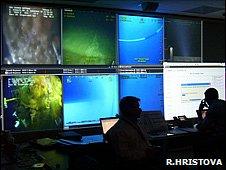'Stepping into an oil industry nightmare'
- Published
Behind the bland facade of a BP office block in the outskirts of Houston, I step into an oil industry nightmare: the headquarters for a battle being fought on a distant seabed.
Along the corridors, signs point the way to the company's "crisis centre".
Originally designed to provide back-up space to cope with hurricanes, it is now hosting a desperate effort to tackle the first leak to erupt beneath a mile of ocean.

The crisis centre is staffed around the clock by a team of 500 people
For a giant of a company, these are tense, threatening times. In fact, one of the first sights to catch my eye inside the centre was a notice offering counselling and massages for stress.
Some 500 people - mostly engineers - work in here in round-the-clock shifts, and they are doing their best to avoid being distracted by the storm of criticism, lawsuits, bills and allegations raging outside.
Of the multiple crises afflicting the company, their attention is focused on the struggle to tame and then kill the "wild well" gushing beyond human reach in the Gulf of Mexico.
'Unthinkable sight'
In one of the few visits allowed to the media, we are led into a series of rooms where different teams focus on different parts of the fight.
The largest is one running the containment operation - each of the vessels collecting oil from the leak is managed by a team here.
One group is from a rival oil firm, Chevron, because one of their ships is being leased to BP and it is easier not to train new people to direct it.

Monitors provide the only visual link engineers have with the spill's source
For a highly competitive industry, this would normally be an unthinkable sight.
A neighbouring room acts as a marine traffic control centre. Having as many as 20 ships and rigs crowded into a small patch of sea above the leak carries risks.
And across a hall lies BP's equivalent of mission control - a darkened room in which one wall carries projected images from the 12 remotely operated vehicles (ROVs) on the ocean floor.
Before we enter, we are asked to be as quiet as possible. The place is wired for instant communications with the ships handling the robots.
The staff, faces cast in the blue-ish light of the screens, are in charge of the only means by which the leak can be contained; only robots can operate at the extreme depths involved.
Will all this succeed? Amid the exhaustion and strain, there is an air of confidence that more oil will gradually be captured and that ultimately the relief wells will block the leak.
But not immediately. A centre intended for the sudden, short-lived threat of a hurricane is likely to be busy for some time to come.